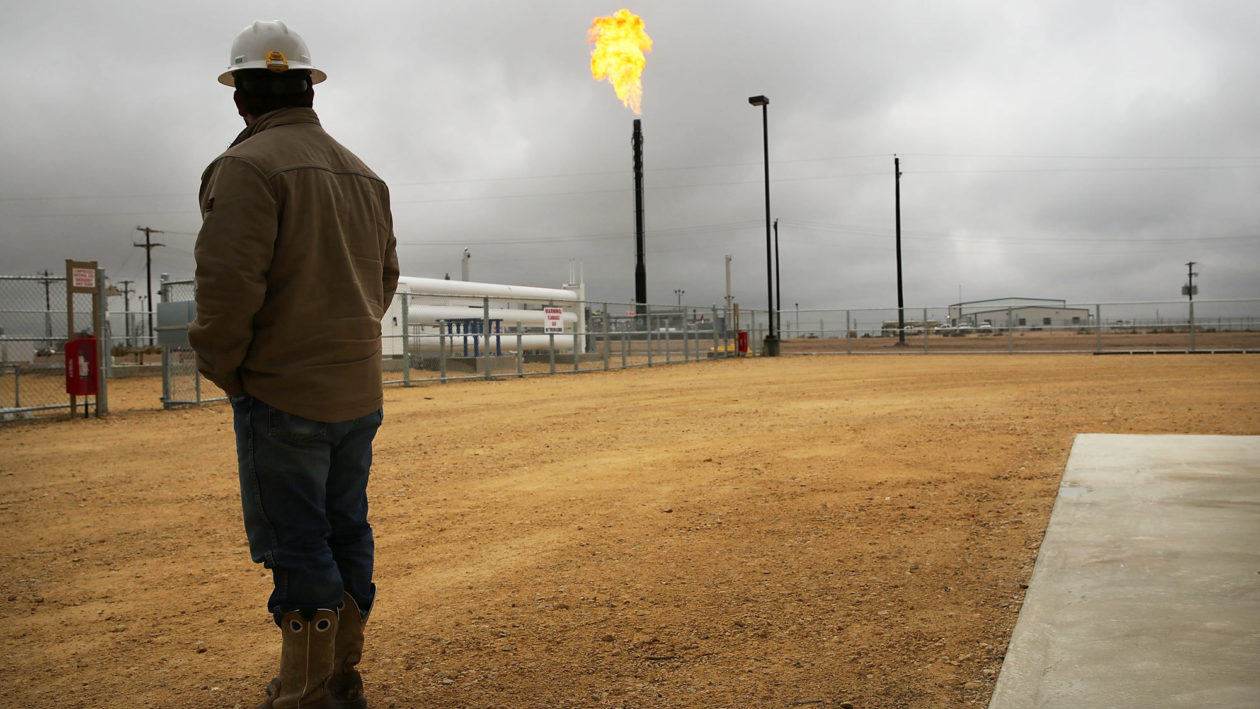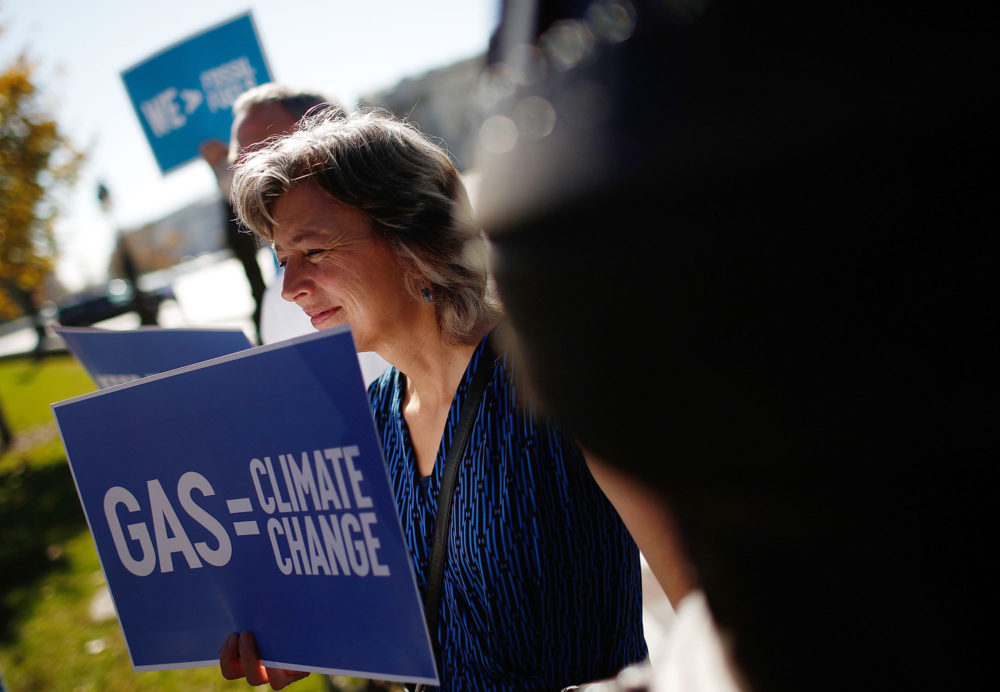Â

Flared natural gas is burned off at a processing plant in Garden City, Texas. Spencer Platt/Getty Images
The climate movement’s biggest failure has been its inability to successfully make the case that natural gas is not a clean replacement for other fossil fuels. So as natural gas has boomed, U.S. emissions of methane, a potent greenhouse gas, have increased dramatically.
Last week, the New Orleans City Council — all Democrats — voted 6-1 to approve a big new gas-fired power plant. Sometime in the coming weeks, in Orange County in upstate New York, another vast new gas power plant is expected to go on line — as soon as it’s hooked up to a new pipeline, one of literally dozens planned across the country. Local opponents — environmentalists, community activists — are fighting hard, but somewhere, almost every day, a new piece of natural gas infrastructure goes up.
When I think about my greatest failing as a communicator — and one of the greatest failings of the climate movement — it’s not that global warming still continues. Stopping it cold was always too high an order: The fossil fuel industry is so rich and powerful, and hydrocarbons so central to our economy, that this battle was always going to be uphill. At best we can limit the damage, and in that we’ve made at least some progress.
It’s not even that Donald Trump managed to win the presidency as a climate denier — in fact, most people regard that stand as stupid, and its not why he took the White House. We’ve more or less managed to persuade Americans that global warming is a real danger. The oil industry’s propaganda effort may have delayed that realization by a generation, but eventually the siege of studies — and of fires, floods, and windstorms — took their inevitable toll.
No, the single most annoying failing is a more technical one, but with huge consequence: Public opinion — and especially elite opinion — still accepts natural gas as a cleaner replacement for other fossil fuels. And this acceptance — nearly as strong among Democrats as Republicans — has meant that we’ve seen huge increases in the use of natural gas. In fact, our essential global warming strategy in America has been to replace coal-fired power plants with ones that run on fracked gas.
Kicking Oxycontin Habit for Heroin
The idea that natural gas combats climate change is a sleight of hand. But explaining why appears to be just slightly too technical for it ever to get across, in the media or on Capitol Hill, in statehouses or city halls. Still, I’ll try one more time.
It’s true that when you burn natural gas in a power plant, you emit less carbon dioxide than when you burn coal — for simplicity’s sake, let’s say half as much. That sounds good, since carbon is the main contributor to climate change. It’s what allowed President Obama to boast in his 2014 State of the Union address that “Over the past eight years, the United States has reduced our total carbon pollution more than any other nation on Earth.â€Â He added, “One of the reasons why is natural gas — if extracted safely, it’s the bridge fuel that can power our economy with less of the carbon pollution that causes climate change.†In fact, his administration was so fond of fracking that the State Department set up an entire agency whose only task was to spread the technology to other countries.
Here’s the trouble: carbon dioxide is the main greenhouse gas, but it’s not the only one.  Another one — present in smaller amounts, but far more potent — is CH4, otherwise known as methane, the primary component of natural gas. If you burn natural gas, you get less carbon dioxide than with coal. But any methane that escapes unburned into the atmosphere on the way to the power plant warms the planet very effectively — so effectively that if you leak more than 2 or 3 percent it’s worse for climate change than coal.

Opponents of natural gas outside the U.S. Capitol in November 2015. Win McNamee / Getty Images
It turns out that there are lots of places for leaks to happen — when you frack a field, when you connect a pipe, when you send gas thousands of miles through pumping stations — and so most studies show that the leakage rate is at least 3 percent and probably higher. What that means is: America has cut its carbon emissions, but only at the cost of dramatically increasing its methane emissions. It means that what we’ve done is run in place.
Put another way, it’s as if we proudly announced that we kicked our Oxycontin habit by taking up heroin instead.
No one wants to hear this.
Democrats don’t want to hear this — natural gas was their get-out-of-jail-free card. They could get credit for going after climate change without really requiring systemic change — in some cases, you could simply convert the existing coal-fired power plant to run on gas. Electricity prices didn’t go up; in fact, fracked gas was cheap enough that it produced much of the early economic boom that powered the Obama recovery.  Now lots of high-level Obama alumni make lots of money working in the natural gas industry.
Environmentalists Must Hear the Natural Gas Facts
The oil industry doesn’t want to hear it. Company after company responds to the climate threat by offering to produce more natural gas to replace coal. As Exxon puts it on its website, “the abundant supplies of natural gas unearthed by the shale revolution in the United States have contributed to a reduction in U.S. carbon-dioxide emissions to levels not seen since the 1990s as electric utilities have switched from coal to natural gas for power generation. … The abundant supplies of natural gas coming from America’s shale fields are positioning the U.S. to be a net exporter of natural gas, which can mean lower emissions worldwide.†We’re not the problem, we’re the solution.
Republicans don’t want to hear it. The Trump Environmental Protection Agency has scrapped even Obama’s modest efforts to plug methane leaks, and as Scott Pruitt, the administrator of the EPA, told reporters in October, “We are leading the nation — excuse me — the world, with respect to our CO2 footprint in reductions.†It’s why the Trump team thinks they can get away with scorning the Paris Agreement: “we’re producing less carbon†takes the pressure off. It certainly works better than telling reporters that climate change isn’t real.
In any event, journalists don’t much want to hear about methane, because it muddies up the simple story line. When the Washington Post fact-checked Pruitt’s statement, for instance, it didn’t even mention the fact that our methane emissions had spiked even as CO2 fell. Instead, it gave him “three Pinocchios,†on the grounds that “Pruitt uses the average per capita decrease instead of the overall decrease, without actually making clear he’s talking about per capita numbers.†As if that was the problem.
Even some environmentalists don’t want to hear it. At first many of them actively promoted natural gas as a bridge fuel. Some would say, “Methane doesn’t last as long in the atmosphere as carbon,†which is true. But sadly, while it’s around, it traps heat far more efficiently, molecule for molecule — and right now happens to be the short window where we’re breaking the climate. Though most of the big green groups eventually came around to understanding the facts about methane, politicians who paint themselves as environmental champions have never shifted their positions. Andrew Cuomo banned fracking in New York, but only because of its effects on local communities where the drilling took place; he’s been happy to approve new power plants that run on gas from elsewhere. Virginia Governor Terry McAuliffe, at last year’s Bonn climate talks, said, “You’re reducing carbon emissions by using natural gas. That’s the answer, plain and simple. We are shutting down coal plants and replacing them with natural gas. That’s a move in the right direction.â€
But it’s not. It’s not a move in any direction at all. It’s standing still. We’re still pouring greenhouse gases into the atmosphere at pretty much the same rate as before.
Fracked Natural Gas Has Slowed Move to Revewables
In fact, the conversion to natural gas is making things markedly worse because the money that gets spent on this useless transition locks us into burning fossil fuel when, with each passing month, the actual alternatives of sun and wind get cheaper and more available. If we hadn’t discovered fracked natural gas, the effort to deal with climate change would have moved us far more quickly into renewables; instead, we’ve wasted a decade and likely far more, since all those new pipelines and power plants are designed (and financed) to last for 40 or 50 years.
We picked the worst possible strategy we could have used to combat climate change. We didn’t know it at first, but as the chemistry became clear no one wanted to change course. Most of them doubled down. I have no confidence that we will ever manage to get this message across, though it is magnificent to see the continuing efforts of local activists across the country. (Check out this new video from Josh Fox, of Gasland fame, in New Orleans)  But it’s not in the interest of anyone in power to concede the facts about natural gas. It’s possible — likely even — that this essay, and everything else I or anyone else writes and says on the topic, is so much shouting into the (increasingly hot and gusty) wind. On this we’ve so far failed, and the failure has had huge consequences.Φ
Bill McKibben is the founder of 350.org, an international environmental organization. He is the author of more than a dozen books about the environment, most recently Oil and Honey: The Education of an Unlikely Activist. This article appeared on March 13 at Yale Environment 360.
